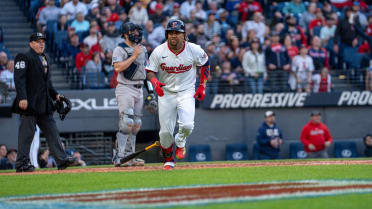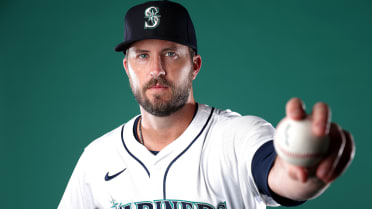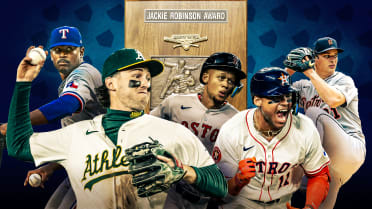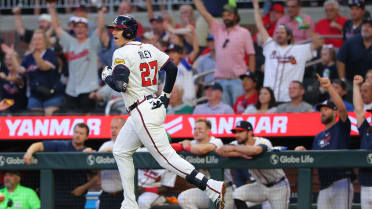Complete games are a dying breed in modern baseball, and when they happen, they’re a somewhat noteworthy occurrence. But a starting pitcher going the distance ... and then some? That’s a true rarity these days, indeed.
The Major Leagues used to see starters record outs past the ninth inning upwards of 150 times per season in the 1910s, and it still happened between 40 and 50 times in several years during the 1980s. But as bullpens gained prominence and teams paid more credence to starters’ pitch counts, nine-plus-inning starts have taken a nosedive.
In fact, since the start of the Wild Card Era in 1995, MLB has seen a starting pitcher get an out in the 10th inning or later just 13 times (by 12 different hurlers). On Aug. 23, 2017, then-Dodgers lefty Rich Hill showed just how hard it can be to get outs past the ninth. Hill carried a no-hitter into the 10th that night, only to watch the Pirates' Josh Harrison hit a walk-off homer in the first at-bat of the inning.
Nobody has come as close as Hill since then, which means that Monday will mark the 10th anniversary of the last time a starting pitcher recorded even a single out in the 10th inning or beyond. Here’s a look back at those 13 most recent marathon-man performances, going back in reverse chronological order:
Cliff Lee, Phillies (at Giants, April 18, 2012)
Final line: 10 IP, 0 R, 7 H, 7 K, 0 BB (1-0 loss)
It’s hard to pitch much better than this in a team loss.
Lee was still near the peak of his powers on this April night by the Bay, when he twirled 10 scoreless innings against the eventual World Series champions before watching teammate Antonio Bastardo give up a walk-off single to Melky Cabrera in the bottom of the 11th. Lee was nearly matched zero for zero by Giants starter Matt Cain, who threw nine scoreless innings and allowed just two hits before yielding the mound to four San Francisco relievers. This game was pitched so efficiently by both sides that it lasted just two hours and 27 minutes, making it the fastest 11-inning Major League contest in 26 years.
Philly’s loss made Lee winless in his first three starts of the season, despite allowing just five combined runs in those contests. He became the first pitcher to throw 10 scoreless innings in a team loss since Bret Saberhagen did so for the Mets in 1994.
Aaron Harang, Reds (vs. Brewers, July 23, 2007)
Final line: 10 IP, 1 R, 7 H, 10 K, 0 BB (2-1 win)
This game was more than a statistical achievement for Harang, as he had just returned from his grandfather’s funeral. The righty came back to the mound and became the first Reds pitcher to throw 10 or more innings in a ballgame since Rick Mahler in 1989, fanning 10 Brewers and walking none before a trio of Cincinnati relievers held down Milwaukee long enough for Javier Valentin to deliver a walk-off single in the bottom of the 12th. Harang’s only run allowed came off the bat of Brewers rookie Ryan Braun, who homered for the 16th time in his first 51 career games.
"I know he's out there with me,” Harang said of his grandfather postgame. “He was a baseball fan. He wouldn't have wanted me to miss a start.”
Roy Halladay, Blue Jays (vs. Tigers, April 13, 2007)
Final line: 10 IP, 1 R, 6 H, 2 K, 0 BB (2-1 win)
Doc was operating at optimal efficiency on this night at Rogers Centre, pitching to contact as only he could while besting Tigers starter Jeremy Bonderman (nine innings, one run allowed) in an excellent duel. Halladay’s two strikeouts were the fewest of anyone on this list, but he snuffed out several Detroit scoring opportunities to make sure Magglio Ordonez (second-inning solo homer) was the only man who came around to score. At the time, Halladay’s career record against the Tigers stood at 11-2 with a 1.83 ERA.
Bartolo Colon, Angels (vs. Athletics, Aug. 30, 2005)
Final line: 9.1 IP, 1 R, 6 H, 3 K, 1 BB (2-1 loss)
Though this was ultimately a game the Halos lost, it was performances like these that helped Colon capture his lone American League Cy Young Award in 2005. The right-hander pitched to contact throughout the night, piling up four ground-ball double plays and needing just 105 pitches to get 28 outs.
Unfortunately for Colon, it wasn’t enough. Barry Zito nearly matched Colon with nine one-run frames of his own, and Angels closer Francisco Rodriguez coughed up a solo homer to Bobby Kielty to start the top of the 11th. A’s closer Huston Street wiggled out of a jam in the bottom half to hand the Angels a tough loss.
Mark Mulder, Cardinals (vs. Astros, April 23, 2005)
Final line: 10 IP, 0 R, 5 H, 5 K, 0 BB (1-0 win)
This was one of several classic contests between a pair of NL Central heavyweights that staged back-to-back NLCS showdowns in 2004 and ‘05. And it featured a pair of heavyweights on the mound in Mulder and Astros ace Roger Clemens, who finished this contest with seven scoreless innings of his own to lower his season ERA to 0.32.
But Mulder was that much better on this 43-degree afternoon in St. Louis, outlasting The Rocket and putting the Cardinals on his back for 10 brilliant innings. The chilly Cardinals hitters needed every ounce of Mulder’s effort until Larry Walker broke the scoreless tie with an RBI single off Brad Lidge in the bottom of the 10th.
Roy Halladay, Blue Jays (vs. Tigers, Sept. 6, 2003)
Final line: 10 IP, 0 R, 3 H, 5 K, 1 BB (1-0 win)
Sensing a pattern? Halladay is the only two-timer on this list, and both of his hard-earned victories came against the Tigers in Toronto. And get this: The losing pitcher in both contests was Fernando Rodney, who surrendered a walk-off sac fly to Alex Rios in the 2007 game, and a walk-off single to Kielty in this ‘03 contest. Both walk-offs came off Rodney in the bottom of the 10th.
Halladay was even more dominant in this one, outdueling another hard-luck Detroit starter in Nate Cornejo (nine scoreless innings) in a game that took just two hours and three minutes to complete. He held the Tigers hitless through 7 2/3 innings, five years after he had a no-hitter broken up against Detroit with two outs in the ninth. Halladay needed just 99 pitches to complete this gem, the fewest thrown in any 10-plus inning shutout dating back to the start of complete pitch-count data in 1988. This was the Majors’ first extra-inning shutout since Jack Morris’ famous Game 7 of the 1991 World Series.
“I really didn’t want to come out; I felt like I had at least two more [innings],” said Halladay. But his catcher, Kevin Cash, put it even better.
“Doc could have pitched until tomorrow.”
Kevin Millwood, Braves (at Cardinals, Aug. 28, 1999)
Final line: 10 IP, 0 R, 2 H, 9 K, 1 BB (3-0 win)
Millwood probably wasn’t the pick for a 10-inning masterpiece out of a Braves rotation that included Hall of Famers Tom Glavine, Greg Maddux and John Smoltz. But Millwood surprised all season long in 1999, finishing with the lowest ERA (2.68) on Atlanta’s star-studded rotation and placing third in NL Cy Young Award voting.
"I only threw five pitches in the first inning,” said Millwood postgame, “but I wasn't happy with the location on any of them.”
Needless to say, he got in a groove after that, as St. Louis was only able to muster a pair of singles against Millwood across 10 innings. Cardinals starter Darren Oliver pitched nine scoreless innings of his own, and this one remained scoreless until the top of the 13th, when Gerald Williams’ RBI single kickstarted a three-run Braves rally. Millwood put in another gem in the 1999 postseason, notching a one-hit, one-run complete-game victory over the Astros in NLDS Game 2 before coming back to get the save on one day of rest in Game 3.
Darryl Kile, Rockies (at Padres, Sept. 20, 1998)
Final line: 10 IP, 0 R, 3 H, 7 K, 2 BB (1-0 win)
These Padres were about a month away from reaching the World Series, but they had no answer for the late Kile on a Sunday afternoon in San Diego. Kile had won 19 games the previous season with the Astros, earning him a three-year, $24 million deal with the Rockies, but his struggles in 1998 (a Major League-most 17 losses and a 5.20 ERA) made him a seemingly unlikely candidate to go the distance. The right-hander looked determined to put those trials behind him on this day, however, as his trademark breaking ball was on point throughout while he stifled the Padres to just three hits.
Kile was brilliant enough to outduel a strong NL Cy Young Award candidate that year in Padres righty Kevin Brown, who went nine scoreless innings on his own. But Kile needed only 103 pitches to complete his 10 frames, making him the first pitcher in Rockies history to go past the ninth.
Brad Radke, Twins (vs. Brewers, Sept. 21, 1997)
Final line: 10 IP, 1 R, 6 H, 9 K, 0 BB (2-1 win)
This was one heck of a way for a pitcher to get his 20th win of the season, but it didn’t look like greatness in the beginning. Radke coughed up a solo homer to Milwaukee’s Jeff Cirillo in the second at-bat of the game before he began to settle, retiring the next eight men he faced in order. The Twins tied the game at one in the sixth, and Radke kept mowing down the Crew until former Brewers star Paul Molitor walked it off with an RBI triple in the 10th.
“I just bee-lined right toward Brad in the dugout,” Molitor would later recall, "and he was overcome by emotion. Brad was his typical humble self, not trying to bring attention to himself, but to see the emotion that he displayed when that happened was great to be a part of.”
Alex Fernandez, White Sox (vs. Twins, Oct. 1, 1995)
Final line: 10 IP, 1 R, 5 H, 6 K, 3 BB (2-1 win)
Fernandez was an anchor for Chicago in the mid-1990s, topping 170 innings in six consecutive seasons on the South Side. And he was an absolute workhorse in a game where he didn’t need to be -- this was the final game of the 1995 season, and the White Sox were far from contention at nine games below .500.
Still, Fernandez refused to yield the ball, battling Minnesota’s Rich Robertson in a scoreless duel until he gave up a sac fly in the top of the ninth. Luckily for Fernandez, slugger Frank Thomas led off the bottom half with a game-tying homer, allowing Fernandez to come back out and work a scoreless 10th. Reliever Roberto Hernandez took over in the top of the 11th, and Robin Ventura walked it off a half-inning later with a single. Fernandez’s brilliant afternoon extended his scoreless streak to 25 2/3 innings to end the season.
Todd Stottlemyre, Athletics (vs. Royals, June 16, 1995)
Final line: 10 IP, 1 R, 5 H, 15 K, 1 BB (3-1 loss)
Stottlemyre’s 15-strikeout night against Kansas City ranks among the most dominant starts in A’s history, but it didn’t result in a win. This game stayed tied at one until the top of the 13th, when two Royals came home on an ugly throwing error by A’s first baseman Mark McGwire, and held on to win, 3-1.
But victory or not, Stottlemyre was on point, surrendering his lone run on the first career homer for Royals center fielder Tom Goodwin in the top of the ninth. Stottlemyre shrugged off that dinger immediately, fanning Wally Joyner to end the inning and picking up two more punchouts in the 10th before yielding to reliever Rick Honeycutt in the 11th.
"That was one of the best-pitched games I've ever seen by a pitcher on our side," said A's manager Tony La Russa. "He made so many outstanding pitches, dozens and dozens of them.”
Bobby Jones, Mets (vs. Astros, June 16, 1995)
Final line: 10 IP, 2 ER, 8 H, 5 K, 0 BB (7-5 loss)
Jones outlasted his opposing starter, Greg Swindell, by three innings, but he had time to shower and eat a meal by the time Jeff Bagwell’s bases-loaded single in the top of the 16th gave Houston a marathon 7-5 victory at Shea Stadium.
Nearly five hours before that, Jones got off to a ho-hum start by allowing runs in each of the first two innings. But he was magnificent after that, scattering three Astros hits and escaping jam after jam. The Mets came back to tie the game twice in extra innings -- and squandered their own runners-in-scoring-position opportunities three times after the ninth -- before Bagwell put an end to things.
"It was one of those funny games," Jones said. "They'd take the lead and we'd come back. It was weird."
Tim Wakefield, Red Sox (vs. Mariners, June 4, 1995)
Final line: 10 IP, 1 R (unearned), 6 H, 5 K, 2 BB (2-1 win)
Wakefield made quite the first impression, allowing just one run in his first two starts in a Boston uniform leading up to this Sunday afternoon at Fenway Park. The knuckleballer kept Seattle’s powerful lineup (sans Ken Griffey Jr. on this day) off the scoreboard for nine straight innings, trading zeroes with Mariners starter Tim Belcher until Wakefield committed a throwing error that allowed Seattle’s Felix Fermin to come home in the top of the 10th.
It was shaping up to be a difficult day for Wakefield, with his magnificent effort doomed by his own miscue, until Troy O’Leary picked up his teammate with a walk-off, two-run homer in the bottom half off Bobby Ayala. Wakefield’s memorable day lowered his ERA to 0.37 after three starts with Boston, and the Red Sox matched their best start since 1971 with a 23-11 record.
Honorable mentions (pre-1995)
Jack Morris, Twins (1991 World Series Game 7)
Final line: 10 IP, 0 R, 7 H, 8 K, 2 BB (1-0 win)
In perhaps the most famous pitcher's duel of all-time, Morris outlasted Braves starter John Smoltz and shut down Atlanta until Gene Larkin walked it off with a 10th-inning single to give the Twins a title-clinching 1-0 victory.
Nolan Ryan, Angels (vs. Red Sox, June 14, 1974)
Final line: 13 IP, 3 R, 8 H, 19 K, 10 BB (4-3 win)
Ryan was doing plenty of superhuman things at this time in his career -- he threw four no-hitters between 1973-75, and struck out a Major League record 383 hitters in '73 -- but this was quietly one of his most remarkable achievements. Game recaps from the time counted 235 pitches out of Ryan's right hand as he tallied his second of three 19-strikeout performances in the '74 season alone.
Though the Angels won in 15 innings, Ryan didn't get the win. Nor did he throw the most frames on the mound that day; his adversary, Luis Tiant, went 14 1/3 innings for Boston before surrendering Denny Doyle's walk-off double. The Los Angeles Times’ game recap simply stated that “Tiant and Ryan dueled tenaciously” -- quite an undersell.
Harvey Haddix, Pirates (at Braves, May 26, 1959)
Final line: 12.2 IP, 1 run (unearned), 1 H, 8 K, 1 BB (1-0 loss)
A strong contender for the most painful loss for any pitcher in history saw Haddix string together an unprecedented 12 perfect innings before it all came apart. Braves starter Lew Burdette (12 hits allowed) matched Haddix zero for zero until the bottom of the 13th, when Pirates third baseman Don Hoak booted a ground ball to break up Haddix's perfect game.
Eddie Mathews bunted the runner over and Haddix intentionally walked Hank Aaron, setting up Joe Adcock's double -- the Braves' first hit of the night -- to walk it off. Rumor has it that Haddix wandered the streets of Milwaukee alone that night in dismay.
Leon Cadore and Joe Oeschger (26 IP each), Brooklyn Robins at Boston Braves, May 1, 1920
Talk about a different era. Each of these men took the ball and refused to give it up for 26 innings before this game was called in a 1-1 tie because of darkness. Cadore faced 96 batters, while Oeschger battled 90 in a contest that is still the longest game in Major League history, and yet lasted just three hours and 50 minutes in real time. Neither pitcher gave up a run across the last 20 innings of play.
Another sign of the times? Cadore and Oeschger's phenomenal feats of endurance weren't mentioned until the ninth paragraph of the New York Times' game recap.
"If a pitcher couldn't go the distance," Oeschger would tell the Sarasota Herald-Tribune decades later, "he soon found himself some other form of occupation."
Matt Kelly is a reporter for MLB.com based in New York.




